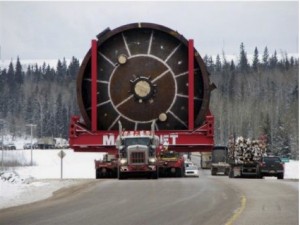Resistance is fertile.
Last week, almost 100 people from Idaho, Montana, Washington, Utah Oregon, California, Oklahoma and different parts of Canada converged outside of Missoula, MT for the Anti-Tar Sands Resistance Summit.
Oregon, Idaho and Montana’s transportation corridor for heavy hauls of mining equipment are fast becoming a hub of resistance to tar sands oil expansion. Companies like Exxon and Conoco Phillips have spent millions in hauling this equipment from South Korea, up the Columbia and Snake Rivers to Lewiston, ID where they are awaiting transport on big rigs to Alberta. Once in Alberta they will continue the expansion of tar sands to feed the Gateway and Keystone XL pipelines with oil to the United States and Asia.
Northern Rockies Rising Tide, Northern Rockies Earth First!, various community and environmental groups in Idaho and Montana, Cascadia Rising Tide and the Indigenous Environmental Network have created networks with plans to stop and slow down tar sands expansion in the transportation corridor.
Also represented were groups fighting tar sands in Utah (90% of U.S. tar sands are in Utah), the Keystone XL pipeline development through the U.S. Mid-West, and the Gateway pipeline expansion through British Columbia.
The summit was marked by non-violent direct action trainings and network strategy development. The fight against the heavy hauls has been in the Idaho courts and will then go into Montana courts after that. Municipalities like Missoula are also lining up to block the heavy hauls through their boundaries.
Tar sands oil extraction is one of the most carbon intensive projects on the planet causing many air and water quality problems for populations near the extractive areas.
ACTION
If you want to help stop the tar sands heavy hauls from coming through Idaho and Montana, sign this petition.
